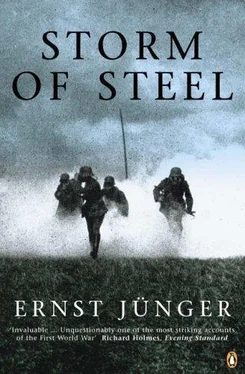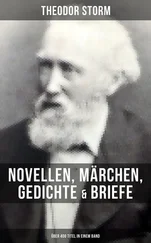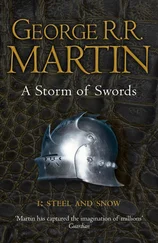Of course we heard bullets whistling past our trench, and sometimes we got a few shells from the forts at Rheims, but these little trifling reminders of war came a long way below our expectations. Even so, we were occasionally reminded of the deadly earnest that lurked behind this seemingly aimless business. On 8 July, for instance, a shell struck the ‘Pheasantry’, and killed our battalion adjutant, Lieutenant Schmidt. The officer in command of the French artillery was, apparently, also the owner of that hunting lodge.
The artillery was still in an advanced position, just behind the front; there was even a field gun incorporated in the front line, rather inadequately concealed under tarpaulins. During a conversation I was having with the ‘powderheads’, I was surprised to notice that the whistling of rifle bullets bothered them much more than the crumps. That’s just the way it is; the hazards of one’s own line of service always seem more rational and less terrifying.
On the stroke of midnight, on 27 January [The birthday of Kaiser Wilhelm II (1859-1941)], we gave the Kaiser three cheers, and all along the front sang ‘Heil dir im Siegerkranz’ [‘Hail thee mid the conquerors’ round’]. The French responded with rifle fire. Sometime round about then, I had a disagreeable experience which might have brought my military career to a premature and somewhat inglorious end. The company was on the left of the line, and towards dawn, following a night on duty, a comrade and I were detailed to go on double sentry duty by the stream bed. On account of the cold,
I had, in breach of regulations, wrapped a blanket round my head, and was leaning against a tree, having set my rifle down in a bush next to me. On hearing a sudden noise behind me, I reached for my weapon – only to find it had disappeared! The duty officer had snuck up on me and taken it without my noticing. By way of punishment, he sent me, armed only with a pickaxe, towards the French posts about a hundred yards away – a cowboys-and-Indians notion that almost did for me. For, during my bizarre punishment watch, a troop of three volunteers ventured forward through the wide reed bed, creating so much rustling that they were spotted right away by the French, and came under fire. One of them, a man called Lang, was hit and never seen again. Since I was standing hard by, I got my share of the then-fashionable platoon salvoes, so that the twigs of the willow tree I was standing next to were whipping round my ears. I gritted my teeth and, out of sheer cussedness, remained standing. As dusk fell, I was brought back to my unit. We were all mightily pleased when we learned that we would finally leave this position, and we celebrated our departure from Orainville with a beery evening in the big barn. On 4 February, we marched back to Bazancourt, and a regiment of Saxons took our place.
From Bazancourt to Hattonchatel
In Bazancourt, a dull little town in Champagne, the company was quartered in the school, which, as a result of our exceptional tidiness, soon came to resemble a peacetime barracks. There was an orderly sergeant, who woke everyone punctually, barracks duty, and roll-call every evening, held by the corporal. In the morning, the companies moved out for a couple of hours’ brisk drill and exercise on the barren fields outside town. I was taken out of this environment after a few days; my regiment was sending me on a training course to Recouvrence.
Recouvrence was a remote little village, nestling in pretty chalk hills, to where all the regiments in the division dispatched a few of their young men to receive a thorough schooling in military matters from a staff of hand-picked officers and NCOs. We of the 73 rd had cause to be grateful to Lieutenant Hoppe for this – and for much else besides.
Life in this secluded hamlet was a strange mixture of barracks drill and academic leisure, attributable to the fact that the bulk of the participants had, until a few months before, been attending various lecture halls and faculties all over Germany. By day, the young people were honed into soldiers by all the rules of the art, while in the evenings, they and their teachers assembled around vast barrels brought over from the stores at Montcornet to display much the same degree of discipline and commitment – to drinking. When the various units trickled back from their respective watering-holes in the early hours, the little chalk village houses were treated to the unfamiliar sight of student high jinks. The course director, a captain, had the pedagogical habit of expecting redoubled efforts in class the following morning.
On one occasion, we were even kept going for forty-eight hours straight. It was for the following reason. We had the respectful custom, at the end of a night’s drinking, of giving our captain an escort home. One evening, an ungodly drunken fellow, who reminded me of Magister Laukhard [A debased version of a Renaissance man (1758-1822): theologian, drunkard, soldier and spy. He fought in the Prussian army against Napoleon, was captured in 1792, and in 1795 managed to escape and return to Germany.], was entrusted with this important task. He was back in next to no time, grinning widely and reporting that he had dropped the ‘old man’ off, not in his billet but in the cowshed.
Our comeuppance was not slow to follow. Just as we had got back to our own quarters for a good lie-down, the alarm was raised by the local watch. Swearing, we buckled on our gear and ran to our stations. We found the captain already there, in a towering temper, as might be imagined, and displaying an extraordinary zeal. He greeted us with the call: ‘Fire-practice, the watch-house is on fire!’
Before the eyes of the astonished villagers, the fire-engine was trundled out of the fire station, the hose attached to it, and the guardroom was inundated with well-aimed sprays of water. The ‘old man’ stood on the stone steps with increasing ire, directing the exercise, and calling on us for unstinting efforts. Every so often, he bawled out some soldier or civilian who happened to provoke him especially, and gave orders for whoever it was to be led off. The unhappy fellow in question was quickly hauled off behind the building, safely out of sight. As dawn broke, we were still standing there, knees shaking, manning the pump. At last we were allowed to dismiss, though only to get ready for morning drill.
When we reached the drill ground, the old man was already there, clean-shaven, fresh and alert, all ready to devote himself with particular zeal to our training.
Relations between the men were very cordial. It was here that I made close friendships, which were to stand the test of many battlefields, with several outstanding fellows, among them Clement, who fell at Monchy, with the painter Tebbe (at Cambrai), and with the Steinforth brothers (at the Somme). Three or four of us roomed together, and shared a household. I particularly remember our regular scrambled egg and fried potato suppers. On Sundays, we ran to rabbit – a local speciality – or chicken. As I was the one in charge of making the purchases, our landlady once showed me a number of vouchers or promissory notes she had received from soldiers requisitioning food; a wonderful selection of earthy humour, generally to the effect that rifleman A. N. Other, having paid his homage to the charms of the daughter of the house, had needed a dozen eggs to help him recoup his strength.
The villagers were quite astonished that we simple soldiers could all speak more or less fluent French. The circumstance gave rise to the occasional droll incident. Once, for instance, I was at the village barber’s with Clement, when one of the waiting Frenchmen called out in his thick Champagne accent to the barber, who was just shaving Clement: ‘Eh, coupe la gorge avec!’ complete with sawing motions at his throat.
Читать дальше












